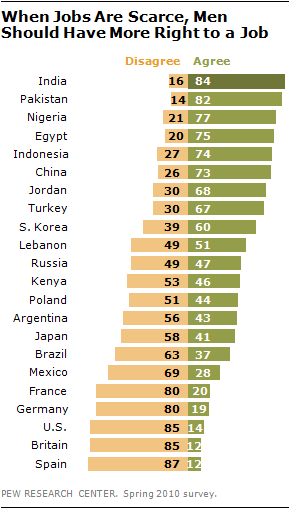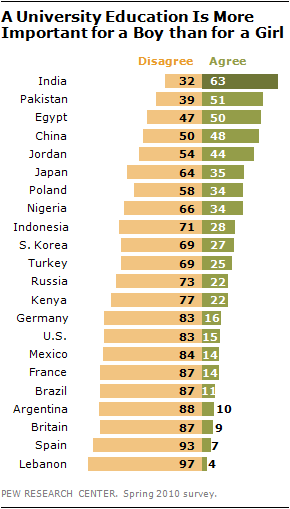By Michael Remez, Senior Writer, Pew Research Center for the People & the Press

The recent gang rape and killing of a young woman in New Delhi – and the subsequent protests – have focused worldwide attention on gender issues in India. A 2010 Pew Global Attitudes Project survey that examined attitudes about gender around the world sheds some light on how public opinion in India compares to the other 21 nations surveyed.
Fully 92% of Indians said that women should have equal rights with men. But when asked specifically which gender should take priority in the workplace during tough times or in higher education, attitudes in India are less supportive of gender equality than in many other countries around the world.1 (The survey did not include specific questions about sexual harassment or rape.)
Virtually all Indians (95%) agreed that women should be able to work outside the home. But more than eight-in-ten (84%) said that when jobs are scarce, men “should have more right to a job than women.” That response made India stand out – it was among the highest percentages in the nations surveyed; a similar percentage (82%) said this in Pakistan.
By comparison, 97% of Americans said women should be able to work outside the home, while just 14% said that when jobs are scarce, men should have more right to a job. That was among the lowest percentage on this question, comparable to the 12% that said this in Britain and Spain.
The view that men get more opportunities than women for jobs that pay well, even when women are as qualified for the job, was widespread in most of the countries surveyed. In India, 83% agreed with this statement, among the highest along with Germany (84%) and Poland (83%). In the U.S., roughly two-thirds (68%) agreed.

On a separate question, more than six-in-ten in India (63%) agreed that a university education is more important for a boy than for a girl, the highest number to say this in the survey. About half in Pakistan (51%), Egypt (50%) and China (48%) also expressed this view.
In the U.S., 83% disagreed. Similarly, more than eight-in-ten disagreed in Britain (87%), Brazil (87%), France (87%), Mexico (84%) and Germany (83%). Virtually all of those surveyed in Lebanon (97%) disagreed.
A majority of Indians (60%) said that a marriage in which both husband and wife have jobs and take care of the house and children is a more satisfying way of life than having the husband provide financially while the wife cares for the household. That’s lower than the majorities in many other countries, including 91% in Spain and France, 84% in Brazil and 78% in China. In the U.S., 71% said a marriage in which both husband and wife have jobs is more satisfying.
Other data also shows India as a country with a continuing gender gap. The World Economic Forum ranked India 105th out of 135 countries in its 2012 Global Gender Gap Index. By comparison, several northern European countries – Iceland, Finland and Norway – top the list, meaning men and women are more likely to have equal opportunities. In this year’s report, the U.S. ranked 22nd.
The ratings combine four sub-indexes to come up with the overall ranking: economic participation and opportunity; educational attainment; health and survival; and political empowerment.
According to the World Economic Forum, India’s ranking gained eight places in 2012 compared to a year ago as a result of improvements in the educational attainment and political empowerment sub-indexes. Still, it is the lowest ranking among emerging BRIC economies of Brazil, Russia, India and China in the index.




